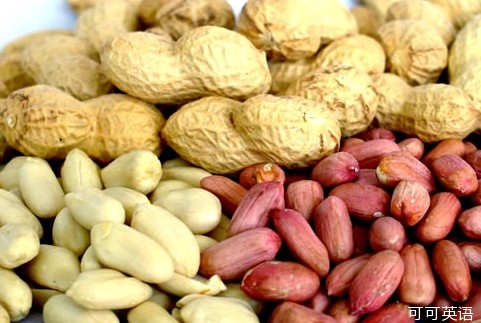
Pregnant women who eat more peanuts and tree nuts during pregnancy might be less likely to bear nut-allergic children, a new study suggests.
一項(xiàng)新的研究發(fā)現(xiàn),孕期女性如果多食用花生和樹(shù)堅(jiān)果,可能會(huì)降低孩子堅(jiān)果過(guò)敏的幾率。
The research, published Monday in the journal JAMA Pediatrics, supports the current consensus among medical professionals that delaying the introduction of nuts, milk, fish, shellfish, eggs and other highly allergenic foods in young children doesn't prevent the development of food allergies, said Michael C. Young, associate clinical professor of pediatrics at Harvard Medical School, and a senior author of the study.
上述研究成果周一發(fā)表在《美國(guó)醫(yī)學(xué)會(huì)小兒科期刊》(JAMA Pediatrics)上。醫(yī)學(xué)專(zhuān)家目前的普遍共識(shí)是,推遲孩子食用堅(jiān)果、牛奶、魚(yú)、貝類(lèi)、雞蛋和其他高致敏性食品的時(shí)間,不會(huì)防止食物過(guò)敏的發(fā)生,哈佛醫(yī)學(xué)院(Harvard Medical School)小兒科臨床副教授兼文章的高級(jí)作者M(jìn)ichael C. Young表示,該研究結(jié)果支持了上述觀點(diǎn)。
The findings inversely link a pregnant mother's consumption of peanuts or tree nuts with the onset of nut allergies in her child. The more nuts the mother ate while pregnant, or within a year before or after pregnancy, the lower the risk that the child would go on to develop nut allergies, Dr. Young said. The study doesn't demonstrate a causal relationship between a pregnant mother's diet and the onset of nut allergies in her offspring, he said.
研究結(jié)果表明,母親孕期的花生或樹(shù)堅(jiān)果的食用量與兒童堅(jiān)果過(guò)敏幾率成反比。Young表示,母親懷孕期間或者孕期前后一年內(nèi)食用的堅(jiān)果越多,孩子堅(jiān)果過(guò)敏的風(fēng)險(xiǎn)越低。研究并未說(shuō)明孕期母親的飲食與兒童堅(jiān)果過(guò)敏之間的因果關(guān)系。
The researchers stopped short of advising pregnant women to eat more nuts. Further, interventional studies -- in which researchers would separate participating pregnant women into groups and prescribe their diets, rather than simply track their consumption -- are required before they can make such a recommendation.
研究人員并未建議孕期女性多食用堅(jiān)果,如果他們要這樣建議,首先要進(jìn)行干預(yù)性研究:研究人員將參與研究的孕期女性進(jìn)行分組并規(guī)定她們的飲食,而不只是跟蹤她們的食量。
Researchers led by A. Lindsay Frazier of the Dana-Farber/Boston Children's Cancer and Blood Disorders Center in Boston, analyzed data from 8,205 children born between Jan. 1, 1990 and Dec. 31, 1994 to mothers who had reported their diets at or around the time of pregnancy. Of the children they tracked, 140 had developed a peanut or tree nut allergy by 2009. All self-reported cases of physician-diagnosed nut allergies were reviewed independently by two pediatricians, according to the study.
Dana-Farber/波士頓兒童癌癥與血液疾病中心(Dana-Farber/Boston Children's Cancer and Blood Disorders Center)的弗雷澤(A. Lindsay Frazier)領(lǐng)導(dǎo)的研究人員分析了1990年1月1日至1994年12月31日期間出生的8,205名兒童的數(shù)據(jù),這些孩子的母親向研究人員匯報(bào)了她們?cè)趹言衅陂g或者懷孕前后的飲食情況。研究發(fā)現(xiàn),他們跟蹤的這些兒童中,到2009年有140人對(duì)花生或堅(jiān)果過(guò)敏。所有自行報(bào)告被醫(yī)生診斷為堅(jiān)果過(guò)敏的兒童都經(jīng)過(guò)了兩位兒科醫(yī)生的獨(dú)立檢查。
The prevalence of childhood peanut allergy in the U.S. has become an 'epidemic' in recent years, Dr. Young said. The rate of 1.4% in 2010 is more than triple the rate of 0.4% in 1997, according to the study. Peanut and tree nut allergies tend to overlap, and such allergies typically become evident with a child's first known exposure to peanuts or tree nuts, the study said. It defines tree nuts as walnuts, almonds, pistachios, cashews, pecans, hazelnuts, macadamias and Brazil nuts.
Young表示,近年來(lái)美國(guó)童兒堅(jiān)果過(guò)敏情況呈擴(kuò)大趨勢(shì)。研究發(fā)現(xiàn),2010年兒童堅(jiān)果過(guò)敏比例為1.4%,較1997年的0.4%高出兩倍多。花生和樹(shù)堅(jiān)果過(guò)敏往往同時(shí)出現(xiàn),當(dāng)兒童首次接觸花生或堅(jiān)果時(shí),是否對(duì)這類(lèi)食物過(guò)敏就已經(jīng)真相大白了。研究所稱(chēng)的樹(shù)堅(jiān)果指的是:核桃、杏仁、開(kāi)心果、腰果、山胡桃、榛子、夏威夷果和巴西堅(jiān)果。
Until recently, the American Academy of Pediatrics had recommended that young children avoid eating peanuts and tree nuts until at least age 3 and cautioned pregnant or nursing women against eating peanuts. In 2008, AAP did away with those guidelines after further studies showed little support for them. The new data support the AAP's move to rescind the recommendation, Dr. Young said. The research 'supports the hypothesis that early allergen exposure increases the likelihood of tolerance and thereby lowers the risk of childhood food allergy,' the study said.
直到近年,美國(guó)兒科學(xué)會(huì)(American Academy of Pediatrics, 簡(jiǎn)稱(chēng)AAP)還在建議兒童3歲前不要食用花生和樹(shù)堅(jiān)果,并告誡懷孕或哺乳期的媽媽也不要食用花生。鑒于進(jìn)一步的研究基本上不支持這些觀點(diǎn),AAP于2008年廢除了這些建議。Young表示,新的數(shù)據(jù)支持了AAP的做法。該研究支持了如下假設(shè):早期接觸過(guò)敏原可以增加對(duì)過(guò)敏原的耐受性,從而降低兒童食物過(guò)敏的風(fēng)險(xiǎn)。
Limitations of the study include that the dietary questionnaires weren't specific to the dates of the mothers' pregnancies. Only 45% of the questionnaires were completed during pregnancy, and 76% within one year.
該研究的局限包括,飲食調(diào)查問(wèn)卷不是專(zhuān)門(mén)針對(duì)懷孕期間的女性。只有45%的問(wèn)卷是在懷孕期間完成的,有76%是在孕期前后一年內(nèi)完成的。
In an editorial also published Monday in JAMA Pediatrics, Ruchi Gupta, associate professor of pediatrics at the Northwestern University Feinberg School of Medicine, counseled pregnant mothers against avoiding nuts for fear of causing their children to develop nut allergies. 'Certainly, women who are allergic to nuts should continue avoiding nuts,' she added.
周一發(fā)表在《美國(guó)醫(yī)學(xué)會(huì)小兒科期刊》上的一篇評(píng)論文章中,西北大學(xué)芬格堡醫(yī)學(xué)院(Northwestern University Feinberg School) 兒科副教授古普塔(Ruchi Gupta)告誡孕期媽媽?zhuān)灰驗(yàn)閾?dān)心孩子會(huì)染上堅(jiān)果過(guò)敏癥而避免食用堅(jiān)果。她還表示,當(dāng)然,那些對(duì)堅(jiān)果過(guò)敏的懷孕女性應(yīng)該繼續(xù)避免接觸到這類(lèi)食物。
'Mothers-to-be should feel free to curb their cravings with a dollop of peanut butter!' Dr. Gupta wrote.
古普塔寫(xiě)道,是否需要食用花生醬,應(yīng)該由準(zhǔn)媽媽們自行決定。


